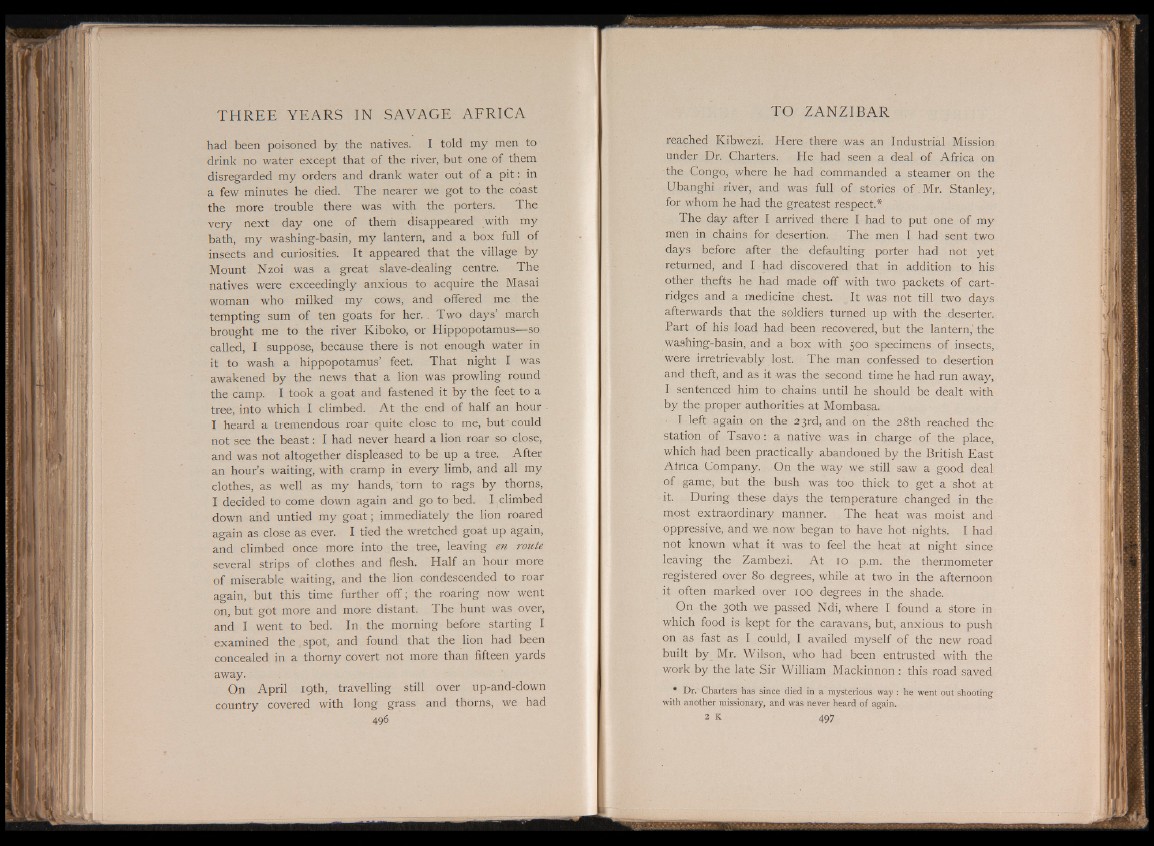
had been poisoned by the natives. I told my men to
drink no water except that of the river, but one of them
disregarded my orders and drank water out of a pit: in
a few minutes he died. The nearer we got to the coast
the more trouble there was with the porters. The
very next day one of them disappeared with my
bath, my washing-basin, my lantern, and a box full of
insects and curiosities. It appeared that the village by
Mount Nzoi was a great slave-dealing centre. The
natives were exceedingly anxious to acquire the Masai
woman who milked my cows, and offered me the
tempting sum of ten goats for her. . Two days’ march
brought me to the river Kiboko, or Hippopotamus—so
called, I suppose, because there is not enough water in
it to wash a hippopotamus’ feet. That night I was
awakened by the news that a lion was prowling round
the camp. I took a goat and fastened it by the feet to a
tree, into which I climbed. At the end of half an hour
I heard a tremendous roar quite close to me, but could
not see the beast: I had never heard a lion roar so close,
and was not altogether displeased to be up a tree. After
an hour’s waiting, with cramp in every limb, and all my
clothes, as well as my hands, torn to rags by thorns,
I decided to come down again and go to bed. I climbed
down and untied my goat; immediately the lion roared
again as close as ever. I tied the wretched goat up again,
and climbed once more into the tree, leaving en route
several strips of clothes and flesh. Half an hour more
of miserable waiting, and the lion condescended to roar
again, but this time further o ff; the roaring now went
on, but got more and more distant. The hunt was over,
and I went to bed. In the morning before starting I
examined the spot, and found that the lion had been
concealed in a thorny covert not more than fifteen yards
away.
On April 19th, travelling still over up-and-down
country covered with long grass and thorns, we had
496
reached Kibwezi. Here there was an Industrial Mission
under Dr. Charters. He had seen a deal of Africa on
the Congo, where he had commanded a steamer on the
Ubanghi river, and was full of stories of.Mr. Stanley,
for whom he had the greatest respect.*
The day after I arrived there I had to put one of my
men in chains for desertion. The men I had sent two
days before after the defaulting porter had not yet
returned, and I had discovered that in addition to his
other thefts he had made off with two packets of cartridges
and a medicine chest. It was not till two days
afterwards that the soldiers turned up with the deserter.
Part of his load had been recovered, but the lantern,'the
washing-basin, and a box with 500 specimens of insects,
were irretrievably lost. The man confessed to desertion
and theft, and as it was the second time he had run away,
I sentenced him to chains until he should be dealt with
by the proper authorities at Mombasa.
I left again on the 23rd, and on the 28th reached the
station of Tsavo: a native was in charge of the place,
which had been practically abandoned by the British East
Africa Company. On the way we still saw a good deal
of game, but the bush was too thick to get a shot at
it. During these days the temperature changed in the
most extraordinary manner. The heat was moist and
oppressive, and we now began to have hot nights. I had
not known what it was to feel the heat at night since
leaving the Zambezi. At 10 p.m. the thermometer
registered over 80 degrees, while at two in the afternoon
it often marked over 100 degrees in the shade.
On the 30th we passed Ndi, where I found a Store in
which food is kept for the caravans, but, anxious to push
on as fast as I could, I availed myself of the new road
built by Mr. Wilson, who had been entrusted with the
work by the late Sir William Mackinnon : this road saved
* Dr. Charters has since died in a mysterious way: he went out shooting
with another missionary, and was never heard of again.
2 K 497